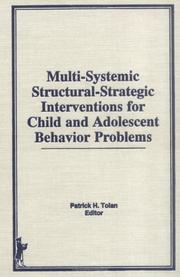| Listing 1 - 9 of 9 |
Sort by
|

ISBN: 086656974X Year: 1990 Publisher: New York The Haworth Press
Abstract | Keywords | Export | Availability | Bookmark
 Loading...
Loading...Choose an application
- Reference Manager
- EndNote
- RefWorks (Direct export to RefWorks)
Book
ISBN: 1489999639 1461475562 1461475570 Year: 2013 Publisher: New York : Springer,
Abstract | Keywords | Export | Availability | Bookmark
 Loading...
Loading...Choose an application
- Reference Manager
- EndNote
- RefWorks (Direct export to RefWorks)
Aggressive behavior among children and adolescents has confounded parents and perplexed professionals—especially those tasked with its treatment and prevention—for countless years. As baffling as these behaviors are, however, recent advances in neuroscience focusing on brain development have helped to make increasing sense of their complexity. Focusing on their most prevalent forms, Oppositional Defiant Disorder and Conduct Disorder, Disruptive Behavior Disorders advances the understanding of DBD on a number of significant fronts. Its neurodevelopmental emphasis within an ecological approach offers links between brain structure and function and critical environmental influences and the development of these specific disorders. The book's findings and theories help to differentiate DBD within the contexts of normal development, non-pathological misbehavior, and non-DBD forms of pathology. Throughout these chapters are myriad implications for accurate identification, effective intervention, and future cross-disciplinary study. Key issues covered include: Gene-environment interaction models. Neurobiological processes and brain functions. Callous-unemotional traits and developmental pathways. Relationships between gender and DBD. Multiple pathways of familial transmission. Disruptive Behavior Disorders is a groundbreaking resource for researchers, scientist-practitioners, and graduate students in clinical child and school psychology, psychiatry, educational psychology, prevention science, child mental health care, developmental psychology, and social work.
Behavior disorders in children --- Conduct disorders in adolescence --- Oppositional defiant disorder in adolescence --- Mental Disorders Diagnosed in Childhood --- Age Groups --- Mental Disorders --- Persons --- Psychiatry and Psychology --- Named Groups --- Child Behavior Disorders --- Attention Deficit and Disruptive Behavior Disorders --- Adolescent --- Child --- Social Sciences --- Psychology --- Behavior disorders in children. --- Attention-deficit disorder in adolescence. --- Conduct disorders in adolescence. --- Oppositional defiant disorders in adolescence. --- Adolescent attention-deficit disorder --- Attention-deficit hyperactivity disorder in adolescence --- Behavior problems in children --- Behavioral disorders in children --- Behavioral problems in children --- Child behavior disorders --- Disruptive behavior disorders in children --- Psychology. --- Maternal and child health services. --- Psychiatry. --- Educational psychology. --- Education --- Social work. --- Child psychology. --- School psychology. --- Developmental psychology. --- Child and School Psychology. --- Educational Psychology. --- Social Work. --- Developmental Psychology. --- Maternal and Child Health. --- Adolescent psychopathology --- Child psychopathology --- Problem children --- Maternal and infant welfare. --- Infant welfare --- Infants --- Maternity welfare --- Child welfare --- Mothers --- Women --- Maternal health services --- Benevolent institutions --- Philanthropy --- Relief stations (for the poor) --- Social service agencies --- Social welfare --- Social work --- Human services --- Psychology, Educational --- Child psychology --- Medicine and psychology --- Mental health --- Psychology, Pathological --- Development (Psychology) --- Developmental psychobiology --- Life cycle, Human --- Charities, protection, etc. --- Charities --- Education—Psychology. --- Psychology, School --- Psychology, Applied --- Behavior, Child --- Child behavior --- Child study --- Children --- Pediatric psychology --- Child development --- Developmental psychology --- Attention-deficit hyperactivity disorder in adolescence.

ISBN: 0471613339 Year: 1993 Volume: vol *14 Publisher: New York, NY ; Chichester : John Wiley,
Abstract | Keywords | Export | Availability | Bookmark
 Loading...
Loading...Choose an application
- Reference Manager
- EndNote
- RefWorks (Direct export to RefWorks)
Adolescence -- Psychologie --- Adolescence -- Psychology --- Adolescent psychology --- Adolescent psychopathology --- Adolescent psychotherapy --- Adolescenten -- Psychologie --- Adolescenten--Psychopathologie --- Adolescenten--Psychotherapie --- Adolescentie -- Psychologie --- Adolescents -- Psychologie --- Adolescents--Psychopathologie --- Adolescents--Psychotherapie --- Psychologie dans l'adolescence --- Psychologie in adolescentie --- Psychopathologie des adolescents --- Psychopathologie van de adolescenten --- Psychopathology [Adolescent ] --- Teenagers -- Psychologie --- Teenagers -- Psychology --- Adolescent psychology. --- Adolescent psychopathology. --- Adolescent psychotherapy. --- Behavior Therapy --- Mental Disorders --- in adolescence. --- Adolescent psychiatry --- Psychotherapy --- Psychopathology, Adolescent --- Child psychopathology --- Psychology, Pathological --- Adolescence --- Teenagers --- Psychology
Book
ISBN: 3319492276 331949225X Year: 2017 Publisher: Cham : Springer International Publishing : Imprint: Springer,
Abstract | Keywords | Export | Availability | Bookmark
 Loading...
Loading...Choose an application
- Reference Manager
- EndNote
- RefWorks (Direct export to RefWorks)
This book examines the current research in gene-environment transactions (GEX) and its potential use in developing interventions and applications tailored to individual genetic makeups. Key concepts underlying GEX studies in this area are defined, identifying fundamental challenges in devising informed research questions and conducting valid and useful experiments. Chapters analyze GEX models inspired by the present day genome-based frameworks, particularly in terms of advances in identifying and understanding complex environmental factors, using examples from common psychological conditions, such as antisocial behavior, chronic physical aggression, and chronic internalizing disorder. In addition, the book presents new and potential applications of the framework in the contexts of prevention science and intervention research. Topics featured in this book include: Epigenetics and the biology of gene x environment interactions. Gene by environment interactions and its potential use for intervention strategies in anxiety disorders. The challenges and potential for research on gene-environment interactions within autism spectrum disorder. Using genetically informed prevention trials to test gene x environment hypothese. Challenges for intervention research within the GEX framework. Gene-Environment Transactions in Developmental Psychopathology is a must-have resource for researchers/professors, clinicians, and related professionals as well as graduate students in developmental psychology, psychiatry, human genetics, and related disciplines.
Psychology. --- Human genetics. --- Psychiatry. --- Developmental psychology. --- Developmental Psychology. --- Human Genetics. --- Psychopaths --- Ethics. --- Antisocial personality disorders --- Psychopathic persons --- Sociopaths --- Patients --- Mentally ill --- Genetics --- Heredity, Human --- Human biology --- Physical anthropology --- Medicine and psychology --- Mental health --- Psychology, Pathological --- Development (Psychology) --- Developmental psychobiology --- Psychology --- Life cycle, Human
Digital
ISBN: 9781461475576 Year: 2013 Publisher: New York, NY Springer
Abstract | Keywords | Export | Availability | Bookmark
 Loading...
Loading...Choose an application
- Reference Manager
- EndNote
- RefWorks (Direct export to RefWorks)
Aggressive behavior among children and adolescents has confounded parents and perplexed professionals—especially those tasked with its treatment and prevention—for countless years. As baffling as these behaviors are, however, recent advances in neuroscience focusing on brain development have helped to make increasing sense of their complexity. Focusing on their most prevalent forms, Oppositional Defiant Disorder and Conduct Disorder, Disruptive Behavior Disorders advances the understanding of DBD on a number of significant fronts. Its neurodevelopmental emphasis within an ecological approach offers links between brain structure and function and critical environmental influences and the development of these specific disorders. The book's findings and theories help to differentiate DBD within the contexts of normal development, non-pathological misbehavior, and non-DBD forms of pathology. Throughout these chapters are myriad implications for accurate identification, effective intervention, and future cross-disciplinary study. Key issues covered include: Gene-environment interaction models. Neurobiological processes and brain functions. Callous-unemotional traits and developmental pathways. Relationships between gender and DBD. Multiple pathways of familial transmission. Disruptive Behavior Disorders is a groundbreaking resource for researchers, scientist-practitioners, and graduate students in clinical child and school psychology, psychiatry, educational psychology, prevention science, child mental health care, developmental psychology, and social work.
Philosophy --- Developmental psychology --- Psychology --- Social welfare methods --- Sociology of social welfare --- Educational psychology --- Paediatrics --- Psychiatry --- Gynaecology. Obstetrics --- sociaal werk --- pedagogische psychologie --- schoolpsychologie --- psychiatrie --- psychologie --- filosofie --- obstetrie --- intensieve zorgen --- kinderpsychologie --- ontwikkelingspsychologie --- ouders-kind relatie --- kraamzorg --- vroedkunde
Digital
ISBN: 9783319492278 Year: 2017 Publisher: Cham Springer International Publishing
Abstract | Keywords | Export | Availability | Bookmark
 Loading...
Loading...Choose an application
- Reference Manager
- EndNote
- RefWorks (Direct export to RefWorks)
This book examines the current research in gene-environment transactions (GEX) and its potential use in developing interventions and applications tailored to individual genetic makeups. Key concepts underlying GEX studies in this area are defined, identifying fundamental challenges in devising informed research questions and conducting valid and useful experiments. Chapters analyze GEX models inspired by the present day genome-based frameworks, particularly in terms of advances in identifying and understanding complex environmental factors, using examples from common psychological conditions, such as antisocial behavior, chronic physical aggression, and chronic internalizing disorder. In addition, the book presents new and potential applications of the framework in the contexts of prevention science and intervention research. Topics featured in this book include: Epigenetics and the biology of gene x environment interactions. Gene by environment interactions and its potential use for intervention strategies in anxiety disorders. The challenges and potential for research on gene-environment interactions within autism spectrum disorder. Using genetically informed prevention trials to test gene x environment hypothese. Challenges for intervention research within the GEX framework. Gene-Environment Transactions in Developmental Psychopathology is a must-have resource for researchers/professors, clinicians, and related professionals as well as graduate students in developmental psychology, psychiatry, human genetics, and related disciplines.
Developmental psychology --- Human genetics --- Psychiatry --- medische genetica --- psychiatrie --- genetica --- ontwikkelingspsychologie --- psychopathologie
Book
Year: 2007 Publisher: [Place of publication not identified] American Psychological Association
Abstract | Keywords | Export | Availability | Bookmark
 Loading...
Loading...Choose an application
- Reference Manager
- EndNote
- RefWorks (Direct export to RefWorks)
Child --- Family --- School Health Services --- Mental Health Services --- Substance-Related Disorders --- Preventive Health Services --- Adolescent --- Age Groups --- Health Services --- Diseases --- Community Health Services --- Behavioral Disciplines and Activities --- Mental Disorders --- Sociology --- Psychology, Social --- Psychiatry and Psychology --- Health Care Facilities, Manpower, and Services --- Persons --- Social Sciences --- Behavior and Behavior Mechanisms --- Named Groups --- Health Care --- Anthropology, Education, Sociology and Social Phenomena --- Social Welfare & Social Work - General --- Social Welfare & Social Work --- Social Sciences
Book
ISBN: 1462541380 1462541402 Year: 2020 Publisher: New York, New York ; London : The Guilford Press,
Abstract | Keywords | Export | Availability | Bookmark
 Loading...
Loading...Choose an application
- Reference Manager
- EndNote
- RefWorks (Direct export to RefWorks)
Antisocial Personality Disorder --- Dangerous Behavior --- Conduct Disorder --- Antisocial personality disorders --- prevention --- prevention & control --- Treatment.
Book
Year: 1990 Publisher: [Place of publication not identified] American Psychological Association
Abstract | Keywords | Export | Availability | Bookmark
 Loading...
Loading...Choose an application
- Reference Manager
- EndNote
- RefWorks (Direct export to RefWorks)
Community psychology --- Community Psychiatry --- Psychology, Social --- Research Design --- Methods --- Research --- Psychiatry --- Behavior and Behavior Mechanisms --- Psychology --- Science --- Investigative Techniques --- Behavioral Sciences --- Medicine --- Psychiatry and Psychology --- Health Occupations --- Behavioral Disciplines and Activities --- Natural Science Disciplines --- Analytical, Diagnostic and Therapeutic Techniques and Equipment --- Disciplines and Occupations --- Mental Illness Prevention --- Public Health --- Health & Biological Sciences --- Congresses
| Listing 1 - 9 of 9 |
Sort by
|

 Search
Search Feedback
Feedback About UniCat
About UniCat  Help
Help News
News